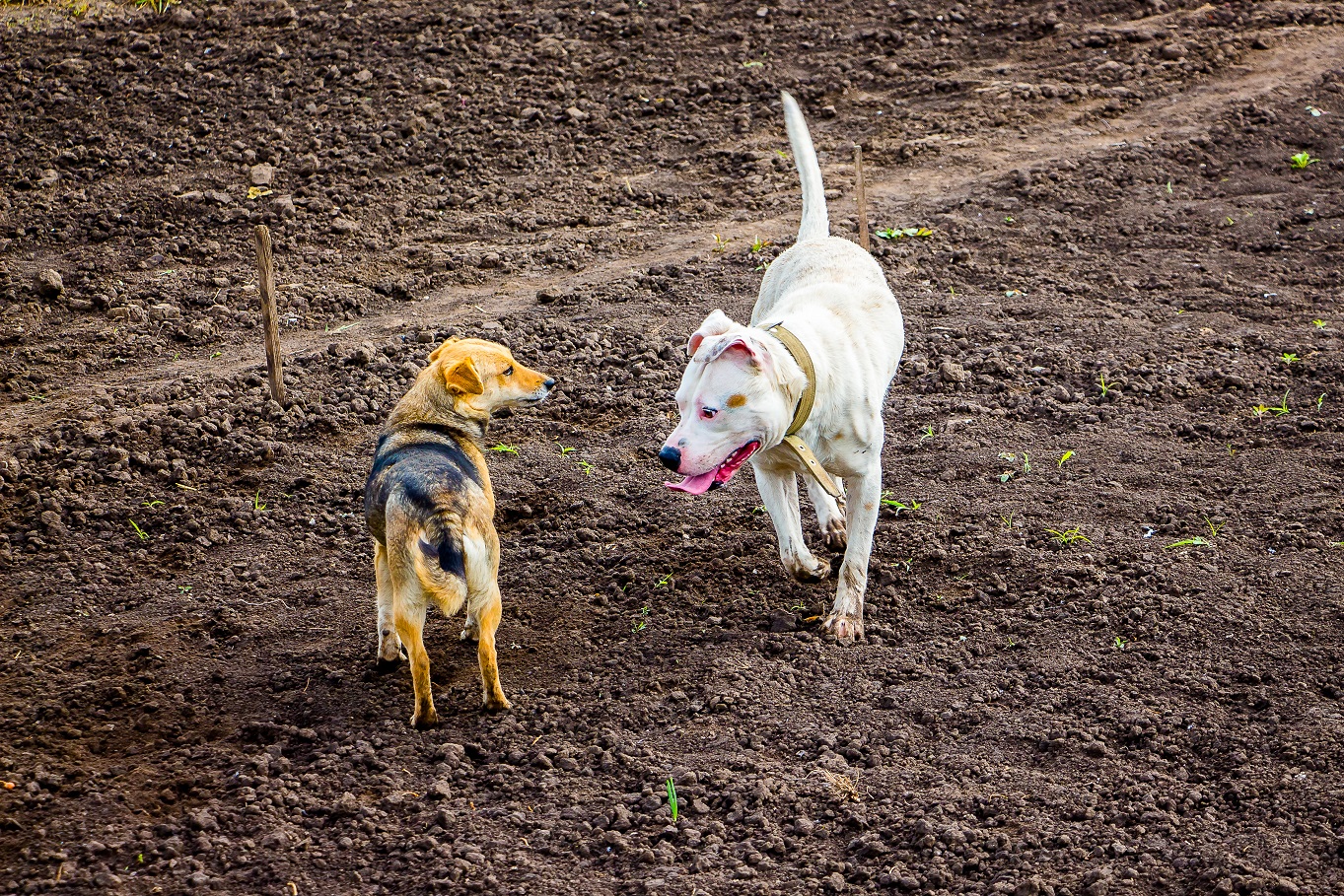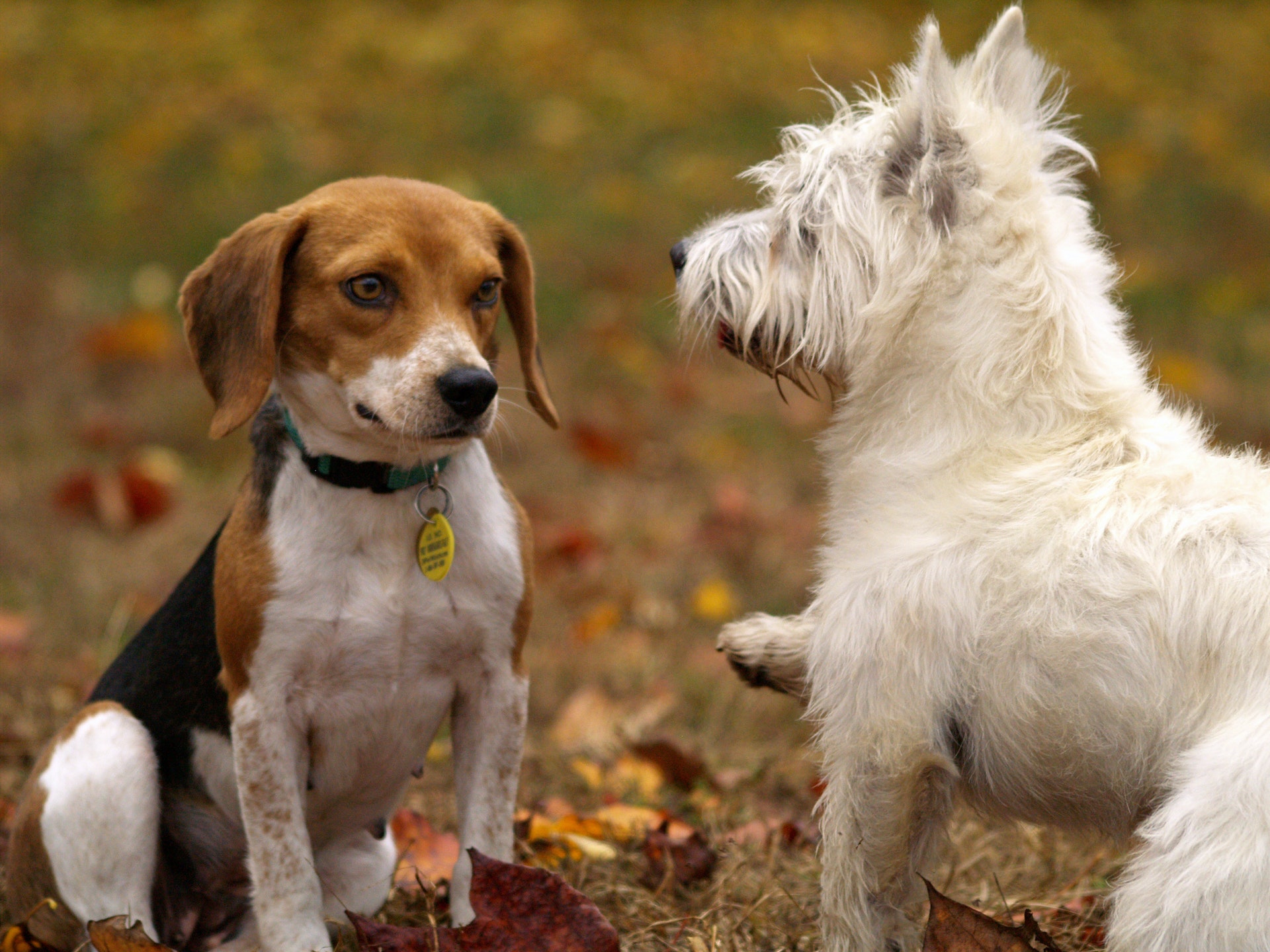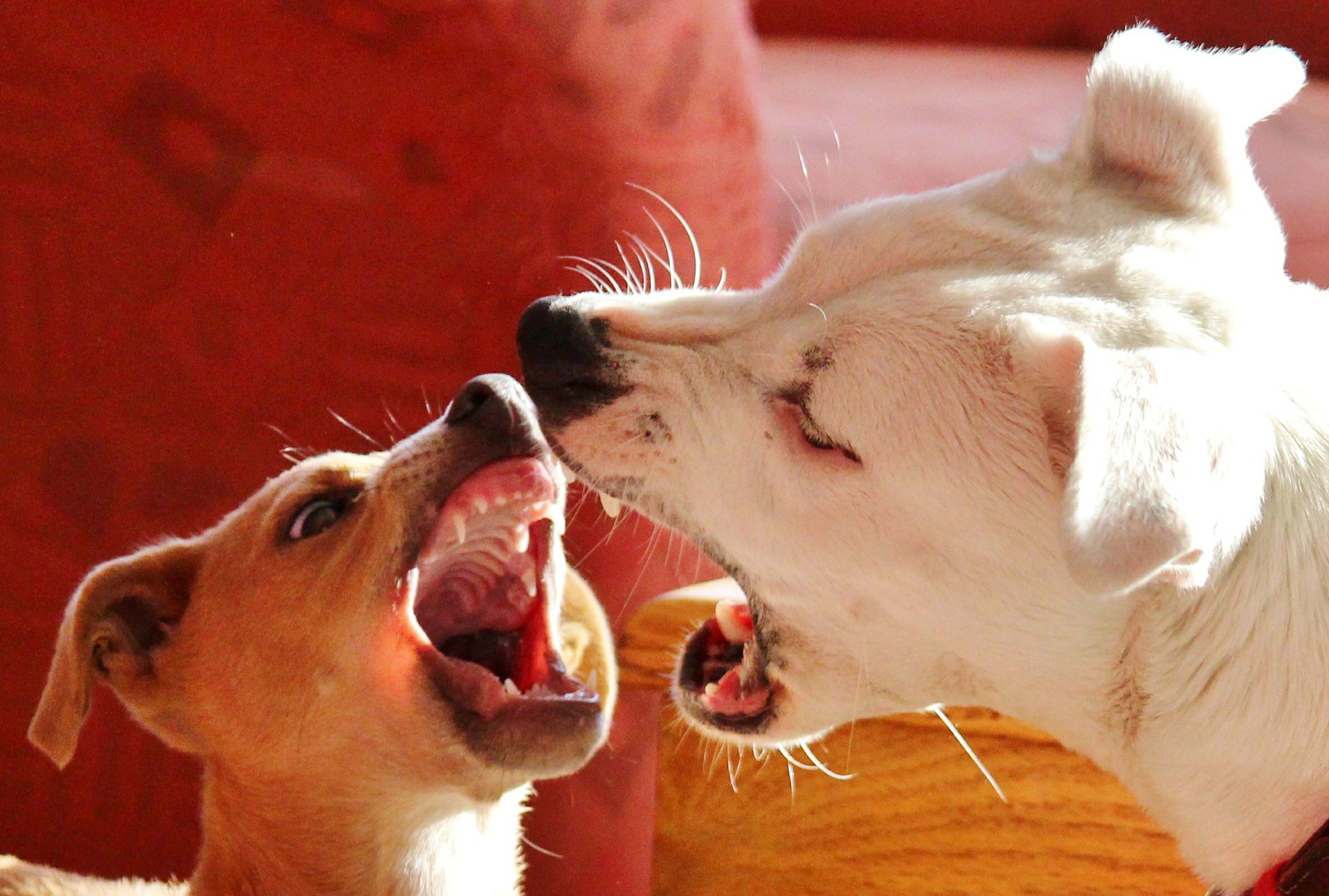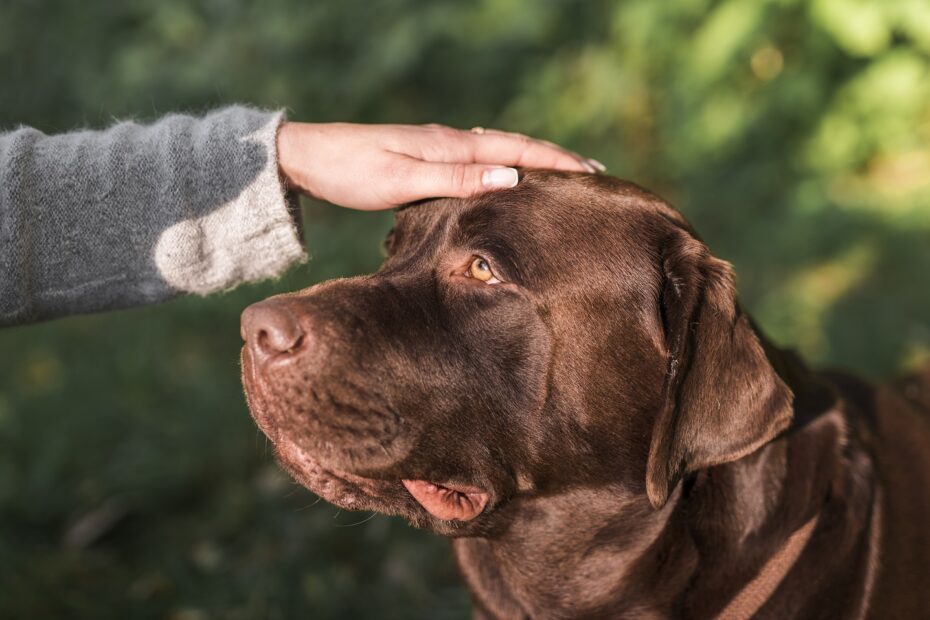If you’re hell-bent on figuring out how to stop an older dog attacking a new puppy, then a hear you, as do thousands of other owners dealing with the exact same issue.
Because while introducing a new puppy into your home should be a time of joy. That same joy can be turned upside down if your dog doesn’t take too kindly to the new arrival.
Worse still, it’s horrible to think of something bad happening to your puppy. And neither is it nice to think about what’s troubling your older dog.
So why exactly would they feel unsettled enough to go on the offensive?
Well, it could be that your older dog is feeling insecure or jealous.
..Maybe it’s that your pup’s naughtiness is driving them to distraction.
…Heck, it could even be that they’re simply trying to teach your pup the difference between right and wrong.
In fact, it could be one of a number of different things. But if you want to start moving forward in a constructive way, figuring out what’s happening is crucial.
Because once you know what the problem is, you can start attacking it with a tailored solution.
The first step? …teaching your dog a little emotional control.
See, emotional control isn’t a naturally learned behavior in dogs, even if your seemingly sweet dog has been placid until now, chances are that the arrival of a new puppy has sent their emotions into overdrive. And as a result, they’re taking it out on your new little pup.
This is why before you do anything else, I’d highly recommend taking a few minutes to check out the short video below from Dan Abdelnoor over at The Online Dog Trainer.
During the video, Dan talks about a powerful technique that takes just minutes a day to implement that will set your older dog off on the right path learning to stay calm and relaxed around your new puppy.
So watch the video, takes notes, and before you know it, what’s troubling your dog will soon become a thing of the past.
Here’s the link to the video: Click Here To Discover A Powerful Training Technique That Will Finally Stop Your Older Dog Attacking Your New Puppy… Even If You’ve Tried & Failed Before!
(video will open in a new window)
Why Is My Older Dog Attacking My New Puppy?
If your household already includes an established dog, introducing a new puppy into the mix can be a nerve-wracking experience.
And if the other dog is a little bit old and a little bit cranky, tensions can quickly reach boiling point.
But therein lies a problem. Some kinds of interactions that look aggressive to us are actually nothing of the sort.
It’s the older dog’s responsibility to teach the new pup how to behave: they know this, the puppy knows this, but unfortunately, the memo didn’t reach us.
Learning to distinguish between natural, constructive interactions and potentially dangerous ones is challenging. But if you want to keep your pup safe without mollycoddling them in the process, it’s also crucial.
To identify exactly what’s happening in your own home, take a look at the following explanations.
Do any sound familiar?
Rudeness
When we see a large, adult dog act in a mean way towards a tiny, defenseless puppy, our instinct is to protect the pup and blame the adult.
But not all aggressive behavior is the fault of the perpetrator, at least in this case.
They may be cute and shiny and all kinds of adorable, but there’s no escaping the fact that puppies can be rude. Very rude, in fact.
Despite being no bigger than a pint glass, puppies will sometimes decide to overturn the current pack hierarchy and make a claim to the throne.
The problem is, they don’t really know how to do it. Cue some very annoying nipping, pouncing, and general misbehavior.
No matter how patient an older animal is, there’s only so much disrespect and harassment they’ll put up with. Especially if we’re not helping the situation with our own actions.
When a puppy pounces on an older dog, we’ll often assume they’re playing and laugh it off. The thing is, it’s not funny for the senior dog.
If your pup keeps trying to assert its dominance, there’s only so long the older dog will hold out before they start sticking up for themselves.
Jealousy
If your older dog is used to having your undivided attention, they might not appreciate suddenly having to share you with an intruder.
Unwittingly, it’s a problem we often contribute to.
Bringing a new puppy home is exciting. We want to spend all our time with them, often at the expense of our old buddy.
If your older dog feels the new puppy is taking up so much of your valuable time and that there’s nothing left for them, it won’t be long before they start making their feelings known.
Territorial Instincts
Dogs are territorial creatures. When someone or something ‘invades’ their patch, you can bet they won’t be dancing cartwheels about it.
If your dog has ever shown any signs of territorial behavior in the past (patrolling the yard, standing duty at the window, barking at the neighbors, throwing the mailman the evil eye, etc.) Then introducing a new dog into your home is going to be a rocky road.
To you, the puppy is a cute little bundle of fun. To your older dog, it’s an intruder.
Lack Of Socialisation
They may be pack animals, but dogs aren’t social butterflies by birthright.
If they aren’t exposed to a wide variety of animals and people from a young age, they might always have problems adapting to them.
Think about how much exposure your older dog has had to other puppies (or, actually, to any kind of animal) over their life.
If it’s next to none, they might be feeling so overwhelmed and daunted by the new addition to the household, they can’t help but lash out in fear.
Dominance
Dogs are pack animals who work within a specific hierarchy. There’s a leader, and then there are subordinates.
If your older dog has established itself as the leader of the pack, then they’ll want to make sure the new puppy knows about it.
Unfortunately, dogs don’t assert their status by sitting down and having a good old chin wag. If there’s a point to be proved, they’ll prove it with their teeth.
Related Post: How To Calm An Aggressive Dog – Simple Tips For Aggressive Behavior

How To Stop An Older Dog Attacking A New Puppy
Aggression should not and cannot be tolerated, ever. Regardless of why your older dog has decided to make your new puppy a target, you need to nip the problem in the bud, pronto.
Left unchecked, both you and your pup could be looking at a world of misery.
Fortunately, there’s plenty of ways you can address the situation.
Just remember one thing… while your older dog might be the ‘aggressor,’ they’re probably no happier about it than you are.
And the introduction of a new puppy has probably left them feeling displaced, confused, and more than a little out of sorts.
Whatever solution or technique you use to address the problem, make sure it’s positive. Scolding or punishing your older dog for their actions won’t stop their behavior.
In fact, it could even make it worse.
Positivity is key to introducing a change for the better…
…Positivity and balance, that is.
And it’s something that will only be achieved if your dog learns to rein in their emotions and exhibit some much-needed calm.
If you haven’t already, make sure you check out the training from Dan Abdelnoor over at The Online Dog Trainer.
Once you introduce Dan’s methods into your routine, you should start noticing a marked improvement in your dog’s behavior.
Don’t just leave the benefits to your older dog either.
If your pup’s over-excitability and hyper-activity are testing your senior dog’s patience, now’s the perfect time to start introducing them to the concept of calm as well.
Once you’ve introduced the exercises, start moving forward with some of these tried and tested strategies.
Establish the Root Cause
If you’ve ever fancied playing detective, now’s your chance.
Keep an eagle eye on your dog’s behavior to work out exactly what’s making them act the way they do.
Take a note of when the aggression happens.
- Is it around mealtimes?
- Does it only happen if you’ve been spending more time with the puppy than with them?
As you’re monitoring the behavior, try to forget your preconceptions.
If your older dog is using their paw to push the puppy away when they’re acting rambunctiously, don’t leap to conclusions and assume it’s aggression.
If your puppy is acting in an inappropriate way, it’s natural for your older dog to teach them the error of their ways.
This isn’t aggression, and it doesn’t need to be corrected.
It’s entirely natural, normal, and necessary for an older dog to ‘correct’ a younger pup if they start acting out. It’s how packs work.
Older dogs are the ones to set boundaries and teach manners. By telling the pup they’re crossing the line, the older dog is effectively teaching them what behaviors are and aren’t acceptable within the framework of the pack.
All of this is to be expected. And it’s certainly not something that needs to be discouraged.
In fact, misinterpreting the older dog’s behavior as jealousy or something equally negative and reprimanding them on that basis can actually create a problem.
The older dog will be confused about why you’re disciplining them for teaching a youngster respect. And your puppy will never learn to respect the boundaries of other animals within the home.
Figuring out exactly what’s behind your dog’s behavior might seem challenging and time-consuming. But if you want to make positive changes, it’s vital… if only to help you understand when your dog is acting naturally and normally. And when they’re displaying behaviors that warrant intervention.

Avoid Showing Favoritism
When you introduce a new puppy into the equation, you upset the natural balance.
After being the sole recipient of your love and affection for so long, your older dog is suddenly having to play second fiddle to a tiny little upstart.
And that’s heartbreaking. Heartbreaking for them and heartbreaking for you.
After all, you know you still love them as much as ever. Unfortunately, getting them to understand that in a way that isn’t going to cause more problems is tricky.
While it’s tempting to shower your older dog with love to show them they’re still your number one, resist the temptation to go overboard.
Although it’s important to spend plenty of time with them, overindulging them to the point they think they have the upper hand over your puppy can be dangerous.
Equally, spending too much time with your puppy and not enough time with your other dog risks upsetting the natural balance.
Avoid playing favorites. The aim is to make both your puppy and your older dog feel they’re loved equally.
Teach Your Puppy Respect
If your older dog is acting inappropriately with your puppy, don’t assume that all the blame lies with them.
Puppies can be frustrating, and there’s only so much an older dog can be expected to put up with before they react.
If your puppy has taken to jumping or pouncing on your older dog, don’t assume it’s harmless fun. You might think so, your puppy might think so, but your other dog probably has different ideas.
While punishment should be avoided, the behavior should still be corrected. If you spot your pup harassing your other dog, simply remove them and issue a firm “No.”
Step in When Necessary
If your puppy sees a senior dog as a plaything, the older dog may respond by jumping up, growling, and barking.
This isn’t necessarily a sign of being overly aggressive, but it does need to be monitored.
After all, adult dogs can, will, and should be allowed to stand up for themselves, but not to the degree that they might hurt the puppy.
During the adjustment period, it may be best to keep the adult dog on a leash so you can quickly step in and remove them from a tense situation.
Just remember that while bad behavior needs to be corrected, punishing a dog will simply serve to make a problem worse.
Teach Obedience
Ultimately, there’s only one pack leader in the house… You.
As pack leader, it’s your job to ensure that all your underlings treat each other with respect and have their needs met.
To assert your status, make training a priority. If your older dog has already received basic obedience training, now’s the time for a refresher.
While you’re revisiting obedience commands with them, take time to teach your pup new commands like sit, come, and down.
To help put each of them in the right frame of mind to focus on training, incorporate the powerful training techniques Dan demonstrates over at The Online Dog Trainer into the start of each session.
Burn Off Some Steam
If your pup’s natural exuberance is starting to wear thin on your senior dog, there’s an obvious solution… exercise.
The more energy they can burn through structured play and walks, the less chance they’ll irritate your senior dog with demands for roughhousing.
Where possible, include your senior dog in your walks as a way to encourage a pack mentality with you as the kingpin.
Related Post: How To Get Your Puppy To Calm Down – 4 Ways To Calm A Hyper Pup

Wrapping Things Up
Introducing a new puppy into a household should be a time of joy and excitement. But sometimes, our expectations aren’t in line with reality.
When a senior dog is suddenly expected to share their life, home, and owner with another dog, tensions can and will arise.
Although it’s never welcome, neither is it unusual. But providing you adopt the right strategy, the adjustment period will pass.
Keep it positive, keep it balanced, and keep it calm… there’s no guarantee your dogs will ever be the best of friends, but the more work you put into it now, the better the chance.

